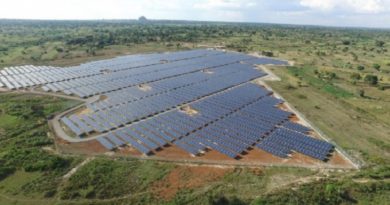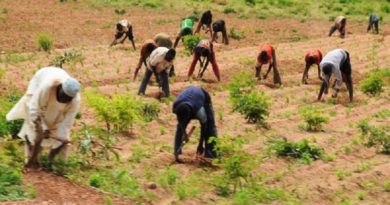Illegal wildlife trafficking: GEF approves additional $40m for Africa, Asia
As part of effort to support the Global Wildlife Programme (GWP) in the fight against illegal trafficking to 19 countries in Africa and Asia, the Global Environment Facility (GEF) Council today approved an additional $40 million for the organisation to expand its programme.
The GWP is a global partnership established to address the growing poaching crisis and an international call to action. The value of illegal trade has been estimated at between $10 and $23 billion per year, making wildlife crime the fourth most lucrative illegal business after narcotics, human trafficking and weapons.
The new $131 million program is expected to leverage $704 million in additional co-financing over seven years. The national projects aim to promote wildlife conservation, wildlife crime prevention, and sustainable development in order to reduce adverse impacts to known threatened species from poaching and illegal trade. Additionally, a global coordination grant from the GEF will strengthen cooperation and facilitate knowledge exchange between national governments, development agency partners, and leading practitioners.
“Poaching and illegal wildlife trafficking are reaching unprecedented levels, robbing the livelihoods of local communities and eroding the global commons,†said Naoko Ishii, GEF CEO and Chairperson. “In response, the GEF has launched a major international effort to help tackle the supply, trade and demand for wildlife products. Importantly, the project is not only about stopping the slaughter of animals in the forests and savannas of Africa; it also aims at reducing the demand in Asia.â€
Combating the illegal trade in wildlife is a high priority for the GEF. Last month, at the UN Environment Assembly in Nairobi, GEF joined other partners to support the launch of the Wild for Life campaign. This new UN-led campaign urges politicians, celebrities and business leaders to help bring global attention to the fight against the illegal wildlife trade.
“The GWP is a direct response to the rampant wildlife poaching and trafficking that are destroying countries’ natural capital, eroding the foundation of important economic sectors such as nature-based tourism, diminishing the rights of local communities and their access to livelihood options, and fueling criminal activities. The World Bank, as lead implementing agency of the GWP, is collaborating with countries and partner agencies to increase capacity and knowledge sharing, and collectively ensure the real value of wildlife is realized†said Ms. Paula Caballero, Senior Director, Environment & Natural Resources Global Practice, World Bank.
The GEF agencies contributing to the partnership include the Asian Development Bank (ADB), International Union for Conservation of Nature (IUCN), United Nations Development Programme (UNDP), United Nations Environment Programme (UNEP), the World Bank Group (WBG) and World Wildlife Fund (WWF).
Helen Clark, UNDP Administrator, said “Wildlife poaching and the illicit trade of wildlife and forest products are abhorrent. This multi-billion dollar worldwide trade is a security issue, an environmental issue, and a development issue. It is pushing vulnerable and endangered species toward extinction. The illicit trade is also fueling corruption and conflict, destroying lives, and deepening poverty and inequality. If not addressed decisively, illicit poaching and wildlife trade will have significant national economic impacts. UNDP is thus proud to be a key partner of the new Global Wildlife Programme, spearheaded and financed by the GEF, in partnership with other organizations, including the World Bank. At UNDP, through these joint efforts, we are committed to helping to stop the illegal trade.â€
“Wildlife crime is serious crime and threatens progress towards sustainable development. It destroys biodiversity, denies governments billions of dollars in revenue, prevents communities from obtaining sustainable livelihoods, and undermines law enforcement and national securityâ€, said Nessim Ahmad, Deputy Director General from the Sustainable Development and Climate Change Department at the Asian Development Bank.
In June 2015, the GEF approved ten national projects from Botswana, Cameroon, Ethiopia, Gabon, India, Indonesia, Mozambique, Republic of Congo, Tanzania and Zambia. Today’s announcement expands this multifocal program to strengthen the capacity of governments to combat poaching and trafficking of wildlife, and wildlife products in key range and transit countries that are in the front lines of combatting wildlife crime. The nine additional countries include Afghanistan, Kenya, Malawi, Mali, Philippines, South Africa, Thailand, Vietnam and Zimbabwe.
“We are excited to welcome the nine additional country projects to the GWP. This is an opportune moment to scale up our collective efforts and use this global program to enhance collaboration and achieve greater results across regions and ecosystems to promote wildlife conservation,†said Dr. Claudia Sobrevila, Global Wildlife Program Manager. “The current crisis in illegal trade of wildlife is a reflection of how much more we need to do to conserve wildlife and promote jobs for local communities. Together with our partners, we are determined to combat wildlife crime across the value chain, engage communities in sustainable livelihood alternatives, and improve the governance of natural resources.â€
“Strong partnerships are essential to tackle the complex and multi-sector issues related to wildlife conservation. Vietnam is committed to strengthening existing partnerships creating new ones to preserve our biodiversity and save endangered species from extinction. With the approval of our national project, Vietnam looks forward to collaborating with other GWP countries to strengthen partnerships and share experiences to help enhance results of the individual national projects,” said Dr. Hoang Thi Thanh Nhan, Deputy Director of Vietnam’s Biodiversity Conservation Agency.
The GWP provides an engagement platform for developing countries and the international donor community to coordinate efforts across the supply chain. Further, it aligns with existing efforts, including the International Consortium to Combat Wildlife Crime (ICCWC) that promotes effective law enforcement and governance nationally and internationally.
Activities in the program in the source countries will include enhancing anti-poaching tracking and intelligence operations, increasing the size of conservation areas and improving their management, and providing opportunities for development through nature-based tourism and other agriculture, forestry and natural resource projects that benefit local communities. In transit states, the program will support anti-smuggling and customs controls and in the demand countries, the GWP will initiate targeted awareness raising campaigns that will help increase legal deterrents for purchase of wildlife and wildlife products.
UNEP Executive Director, Achim Steiner said, “The victims of wildlife crime are not only the animals and ecosystems that are devastated by poaching and trafficking, they are people as well. The human cost of poaching and illegal trade in wildlife is measured in lives lost to the criminal networks involved and livelihoods destroyed by the erosion of a natural economic foundation. Ending the illegal trade in wildlife requires a concerted and cooperative effort between all sectors. These new projects will further these efforts and help bring us closer to ending wildlife crime once and for all.”
“Illegal wildlife trade in the Philippines contributes to economic losses of at least $240 million per year. We are pleased to work with our partners to strengthen the law enforcement chain and reduce demand for illegal wildlife and wildlife parts. The GEF project will reinforce implementation of the long-term Wildlife Law Enforcement Action Plan (WildLEAP) 2016-2028 – a national framework to combat wildlife trafficking in the country and promote wildlife conservation and inclusive growth,” said Atty Mundita Lim, Director, Biodiversity Management Bureau, Department of Natural Resources and Environment.
Collectively, the GWP countries make up an incredible repository of biodiversity and potential for sustainable development. The Program’s integrated platform will support national governments and development partners implement targeted interventions to help reverse the impacts of wildlife lost to poaching and negative livelihood impacts experienced by local communities.
The 50th GEF Council Meeting is taking place from June 7-9, 2016, in Washington DC. The Council meeting also marks the 25th anniversary of the GEF being at the forefront of tackling the planet’s most pressing environmental problems. In its 25-year history, the GEF has invested some $14.5 billion – and leveraged an additional $75.4 billion – for nearly 4,000 projects in 167 countries.




